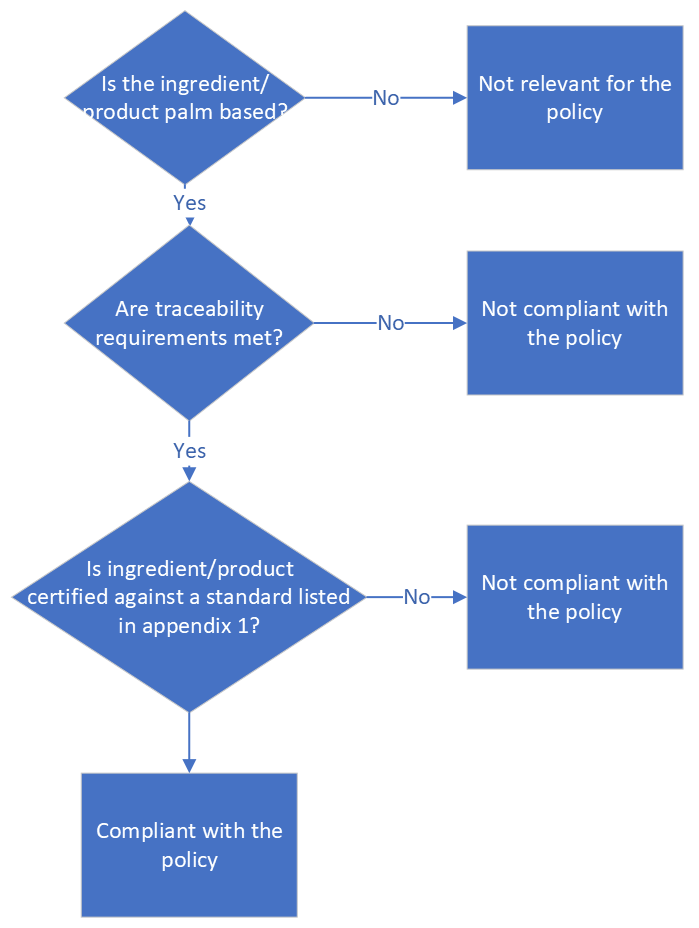Sustainable Palm procurement policy for suppliers
Approved by Avon International CEO July 2025.
1. Introduction
At Avon International, we’re passionate about making the world a better place and doing beauty differently. Our sustainability vision is to create a better world for women, which is better world for all, and to have a positive impact on our climate and communities. At Avon International, as part of our sustainability journey, we recognise that some materials we use that some materials we use have significant social or environmental risks. We therefore aim for full traceability and/or certification of palm purchased. We are also committed to No Deforestation, No Peat and No Exploitation (NDPE) principles and no conversion as defined by the Accountability Framework Initiative and to supporting forest conservation solutions for high conservation landscapes.
- Key social and environmental risks: Palm in the form of palm oil, palm kernel oil and their derivatives is a high sustainability risk material from both an environmental and social perspective. Key risks are deforestation, peatland destruction, land conversion and labour and human rights violations on plantations, as well carbon emissions land grabbing. Traceability and certification are tools Avon International is using to manage and reducese risks in our supply chains.
- Scope: Avon International uses palm mainly as oleochemical derivatives in cosmetic ingredients (for example, glycerine), as well as in some home accessories. This policy applies to all raw materials and finished goods identified and declared as palm-based by suppliers. All palm-derived ingredients and finished goods supplied to Avon International must meet the sustainability requirements set out below*. These requirements will be applied in Avon International tenders, supplier and material approval processes and are applicable to all palm used in goods for resale; whether manufactured internally or by third parties. Should we find that any purchased goods or materials do not meet these requirements, we will engage the supplier to change practices and/or re-evaluate our relationship with them in line with the Avon International supplier code of conduct.
- Traceability and certification requirements in brief: All Avon International suppliers must provide relevant information on the origin of palm cultivation for all palm containing ingredients and finished goods in scope. All palm containing ingredients and goods must be traceable and certified to a minimum of RSPO Mass Balance standard by the end of 2025 for materials and by the end of 2030 for finished goods**. Additional certification standards with equivalent or stronger social and environmental criteria than RSPO MB are encouraged, as per appendix 1.
- Supplier milestones:
2. Detailed Requirements
Traceability
All Avon International suppliers of palm containing ingredients and finished goods in scope must provide accurate information on the palm feedstock and the cultivation origin, as part of Avon International tenders, supplier, product and ingredient approval procedures and annual reporting. Suppliers are expected to provide information on mills (as a minimum), refineries, and provinces of cultivation to appointed third parties. Failure to provide accurate and timely traceability information on request may result in rejection.
Certification requirements
All Avon International suppliers must provide a valid certificate for the applicable third-party standard for the palm ingredients supplied or palm contained in finished goods, and (where applicable) develop the right capabilities, e.g. supplier chain of custody certification, in the format required by Avon International. Acceptable certification standards are outlined in appendix 1.
Unacceptable sources of palm
Avon International will support suppliers to grow their capabilities in the areas of traceability and certification, however if suppliers are not willing to develop capability to deliver traceable and certified palm materials as per the requirements of this policy, they will not be used to supply palm containing ingredients and finished products to Avon International after 31/12/2023. Any suppliers found to be involved in human rights violations, environmentally destructive practices or otherwise violating the Avon International supplier code of conduct may be exited.
3. Collaboration and contact
Above and beyond these requirements, we encourage you and your suppliers to participate in and support collaborations to ensure that poor labour conditions and environmental damage in particular deforestation are eliminated from palm supply chains. We also need support from suppliers to help us meet the Avon International commitment to become Net Zero by 2050 and set a Carbon reduction pathway in line with the SBTi requirements. We further encourage our suppliers to come forward with proposals for more traceable, sustainable and regenerative palm containing ingredients and finished goods that we can use in our business. Avon International is an active member of Roundtable on Sustainable Palm (RSPO) and Action for Sustainable Derivatives (ASD) and we encourage you to join these and other collaborations to deliver sustainable improvements across palm sector.
For further information on this policy, possible exceptions and Avon International plans to achieve 100% traceable and/or certified palm, please contact critical.materials@avon.com.
Flow chart – requirements for palm containing ingredients and finished goods

Appendix 1
Acceptable certification standards for palm
By 31/12/2025 at the latest, all palm containing ingredients and finished goods certified to at least one of the third-party standards from the table below.
|
Acceptable certification schemes |
Certification abbreviation & website |
Certification description |
|
Regenerative Organic Certified |
ROC |
An international standard that sets requirements for soil health, animal welfare, and farmworker fairness. |
|
Fair for Life |
FFL |
An international, voluntary standard that sets requirements for third-party certification of fair trade and organic input and chain of custody |
|
The Union for Ethical BioTrade |
UEBT |
An international standard promoting the conservation of biodiversity, respecting traditional knowledge and assuring the equitable sharing of benefits all along the supply chain. |
|
Roundtable on Sustainable Palm Oil Identity Preserved Standard |
RSPO IP |
An international standard designed to assure palm oil production is sustainable: legal, economically viable, environmentally appropriate and socially beneficial. Identity Preserved assures sustainable palm oil from a single identifiable certified source, kept separate from ordinary palm oil throughout supply chain. |
|
Roundtable on Sustainable Palm Oil Segregated Standard |
RSPO SG |
An international standard designed to assure palm oil production is sustainable: legal, economically viable, environmentally appropriate and socially beneficial. Segregated assures sustainable palm oil from different certified sources, kept separate from ordinary palm oil throughout supply chain. |
|
Roundtable on Sustainable Palm Oil Mass Balance Standard |
RSPO MB |
An international standard designed to assure palm oil production is sustainable: legal, economically viable, environmentally appropriate and socially beneficial. Mass Balance assures sustainable palm oil from certified sources, mixed with ordinary palm oil throughout supply chain. |
|
Roundtable on Sustainable Palm Independent Smallholder Credits |
RSPO ISH Credits |
The RSPO Independent Smallholder (ISH) Credits market incentivises RSPO Certified Independent Smallholders to earn premiums for their sustainability efforts, regardless of their location or plot size. This makes the RSPO ISH Credit market more sustainable and inclusive. |
|
Rainforest Alliance |
RA |
An international standard assuring product or ingredient was produced using methods that support the three pillars of sustainability: social, economic, and environmental. |
Additional third-party standards may be added to this list if they provide acceptable social and environmental sustainability assurance in palm supply chains.
*Tail ingredients containing very low content of palm such as fragrances are out of scope
**Independent smallholder credits may still be claimed to cover any remaining uncertified tail materials (up to 5% of total palm weight)



